高中英语学案含解析外研版必修4
外研版必修4Module2学案
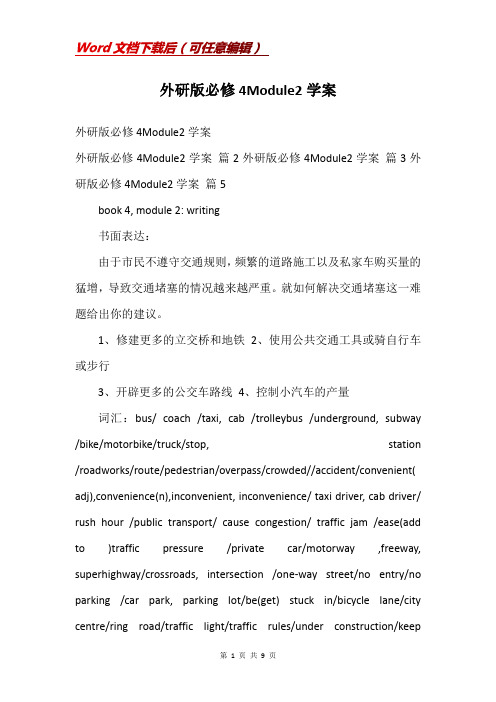
外研版必修4Module2学案外研版必修4Module2学案外研版必修4Module2学案篇2外研版必修4Module2学案篇3外研版必修4Module2学案篇5book 4, module 2: writing书面表达:由于市民不遵守交通规则,频繁的道路施工以及私家车购买量的猛增,导致交通堵塞的情况越来越严重。
就如何解决交通堵塞这一难题给出你的建议。
1、修建更多的立交桥和地铁2、使用公共交通工具或骑自行车或步行3、开辟更多的公交车路线4、控制小汽车的产量词汇:bus/ coach /taxi, cab /trolleybus /underground, subway /bike/motorbike/truck/stop, station /roadworks/route/pedestrian/overpass/crowded//accident/convenient( adj),convenience(n),inconvenient, inconvenience/ taxi driver, cab driver/ rush hour /public transport/ cause congestion/ traffic jam /ease(add to )traffic pressure /private car/motorway ,freeway, superhighway/crossroads, intersection /one-way street/no entry/no parking /car park, parking lot/be(get) stuck in/bicycle lane/city centre/ring road/traffic light/traffic rules/under construction/keepcool/…句型:1. what’s the problem with… ?2. what’s the solution to the problem?3. it’s time for sb to do sth./it’s high time that sb did sth.4. we should take measures/steps/action to do sth./measures should be taken to…5.the reason why… is that…6. it’s a good idea to…7.how about/what about…? 8.why not/why don’t we… ? 9.let’s do …10.we’d better (not) do…补充:第一:first/firstly/at first/first of all/in the first place/to begin with/to start with/for one thing…第二: second/secondly/in the second place/next/then/for another thing…第三: third/thirdly/besides/in addition/furthermore/moreover/what’s more…最后/总之: finally/at last/lastly/in the last place/last of all/last but not least/in a word/in a nutshell…参考范文the traffic jams have become a terrible problem and they are usually caused by people _______________________________________________________ (不遵守交通规则)and_____________(道路施工)on the streets. besides, the increase of new cars also_______________________________________(导致)the traffic jams . therefore, __________________________________________(交通堵塞越来越严重). this causes people’s inconvenience and it’s high time _________________________________(采取措施解决这一问题). what’s the solution to the problem? my suggestions are as follows: ____________(第一), we should build more__________(立交桥) and underground lines so as to ______________________(缓解交通压力). _______________(第二),we’d better go to work or go shopping by bus ,by bike or on foot instead of driving private cars. __________(第三), ______________________(好点子) to open up more public bus routes. __________(最后), the production of cars should ____________(控制), for there are too many cars moving on the roads every day.________(总之), i believe we can improve our traffic conditions if we try our best.book 4 module 2 p12getting around in beijingread the passage and answer:1.________________________________________________________(招手,立刻就有出租车)time:2.they are usually red, and they _________the price per kilometeron the window.3.you should check the cab has a business _________(permit/permission), and ______________you ask for a ___________(发票,收据).4.public transport ___________(offer/provide/supply)a cheap way to _____________in beijing.5.there are 20,000 buses and _____________(电车)in beijing, but they __________(must/should/can) get very ___________.6.____________________________________to avoid public transport during the rush hour.7.________(车费)are cheap, _____________(to start/starting/started) at 1 yuan.8.buses numbered 1 to 100 ________________(limit)travel within the city centre. higher numbers have destinations _______________________(郊区).9.tourists shouldn’t miss the 103bus _______ offers one of the most ____________(impress/impressive/impression) routs, _________ the forbidden city and the white pagoda in beihai park.10.you’ll ______________________(看见) the rapidly changing city.11.however, there is also a night bus service, provided by buses with a number in the 200s.12.there _____(is/are) four _____________ lines in beijing, andseveral lines are _________________________. trains are fast and ________________(方便的), but rush hours _______ be terrible.13.tourists like these human-pedalled “tricycle taxis”, but they ________ be expensive.14.you should talk to the driver ,and make sure you know the price before you begin the journey, for example, if it is per person, single, or return.(分析本句)15.tricycles are worth_____________(use/to use/using/being used/to be used), if you want to __________ (explore/exploration) the narrow alleys(hutong)of old beijing.book 4 module 2 p14speaker 1on my way home a few days ago, i _______ _________ again in the traffic. while i was waiting, i saw a group of taxi drivers in front of me getting out of their cars. they seemed to know each other. they had coffee cups and one of them carried a thermos flask and ________ _______ some hot water to make tea. it was quite funny! but even after the tea party was over, the traffic was still _________ and we still couldn’t move.speaker 2a few days ago i had to catch a plane to sichuan province. the plane took off at 5:30 pm so i set off at ______ pm to allow plenty of time toget to the airport. but it wasn’t enough time. at 5 pm i was still only at the third _______ ________. it was just ridiculous! there was____ ____ i was going to catch the plane, so i told the taxi driver to turn back and go home.speaker 3it’s only 7 kilometers from my home to my place of work. but every day, it is almost certain there will be a traffic ______ as i get near the west fourth ring road. it’s so annoying! it takes at least 15 to 20 minutes to _______ ___________ it. i think the traffic jams are usually caused by people disobeying traffic rules. to get to the front of the line, they often take the bicycle _______. it’s the same with pedestrians and cyclists. they don’t wait for the green light to pass.speaker 4beijing traffic seems to have got noticeably worse recently. the causes seem to be __________ as the city prepares for the olympics, and a huge increase in new car owners and new drivers. whatever the cause, it’s enough to __________ you mad! why not limit the number of cars, build more _______________ lines or follow shanghai and build roads in the sky? these days i only go out in my car at night after 9 pm. that way i avoid the worst of the traffic.speaker 5going to the summer palace the other evening there was a bigtraffic jam at a narrow bridge. one lane in either direction. so obviously there were lots of cars _____________ on the wrong side of the road which then came to a complete stop when a car came ____ the other direction. result :no one was able to move for 10 minutes! as soon as it _____________ the same thing happened again. it’s unbelievable!book 4 module 2 p77conversation 1a: hello.nora: hi. it’s me , nora.a: hello. have you got your ticket?n: yes. i am coming on the ____th of june. the plane arrives at 5 pm. then i have a __________ at 6:15.a: that’s _________ hour. the roads will be very busy.n: how can i get to the central bus station?a: take the number 23bus at the airport. it will be just as quick as a taxi.n: thanks. i’ll let you know how i _________ ________.conversation 2a: hello.n: hi. it’s me. nora. there’s no way i’ll get to the bus ____________ in time for my coach. i’m on the 23 bus and it’s stuck in a traffic jam. it’s just ridiculous!a: oh dear. where are you exactly?n: on the ring road, not far from the hospital.a: keep _________! i’ve got an idea. why not take the underground? there’s a station near the hospital. it’ ll be _____________ but much quicker than the bus.n: good idea. i’ll phone you later.conversation 3a: hello.n: hi. it’s me again.a: hi, nora. where are you now?n: i’m at the bus station but i’ve __________ the coach. it’s so annoying! i only missed it by 2 minutes.a: listen! the coach stops at the railway station. take a taxi there now and you may catch the coach.n: ok. it’s worth ____________. i’ll speak to you later.conversation 4a: hello.n: it’s me again.a: where are you this time?n: on the coach! i finally ___________ ________ .a: it’s unbelievable!n: how do i get to your apartment from the coach station?a: ________ in the bus station ________ i’ll come and get you. what time do you arrive?n: at 8 o’ clock.a: see you then.n: thanks.。
Unit 4 Reading 学案- 高二英语外研版(2019)选择性必修第四册(有答案)
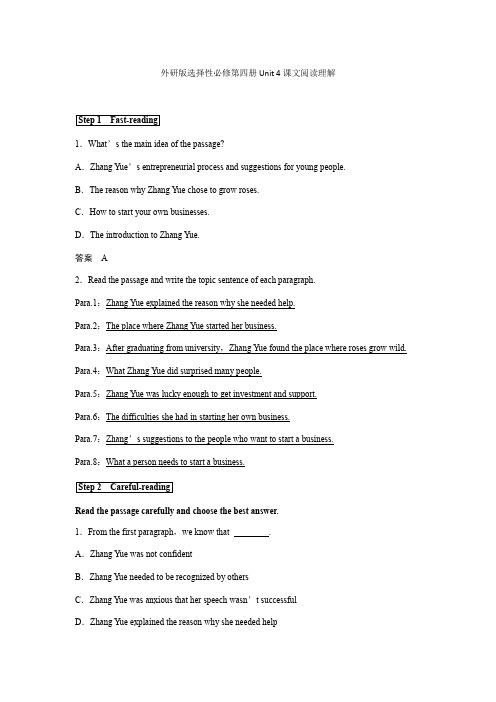
外研版选择性必修第四册Unit 4课文阅读理解Step 1Fast-reading1.What’s the main idea of the passage?A.Zhang Yue’s entrepreneurial process and suggestions for young people.B.The reason why Zhang Y ue chose to grow roses.C.How to start your own businesses.D.The introduction to Zhang Y ue.答案A2.Read the passage and write the topic sentence of each paragraph.Para.1:Zhang Yue explained the reason why she needed help.Para.2:The place where Zhang Yue started her business.Para.3:After graduating from university,Zhang Yue found the place where roses grow wild. Para.4:What Zhang Y ue did surprised many people.Para.5:Zhang Yue was lucky enough to get investment and support.Para.6:The difficulties she had in starting her own business.Para.7:Zhang’s suggestions to the people who want to start a business.Para.8:What a person needs to start a business.Step 2Careful-readingRead the passage carefully and choose the best answer.1.From the first paragraph,we know that .A.Zhang Yue was not confidentB.Zhang Yue needed to be recognized by othersC.Zhang Yue was anxious that her speech wasn’t successfulD.Zhang Yue explained the reason why she needed help2.Which of the following sentence is RIGHT?A.Before graduating from university,Zhang Yue had an idea to grow roses in her hometown. B.The place where she grew roses was near the television studio.C.Many people didn’t understand Zhang Yue’s idea about growing roses.D.The reason she wanted to grow roses was to make money.3.What does the sentence “She is not the only young person to have been bitten by the start-up bug.” mean?A.She was once bitten by a bug.B.It’s not easy to start a business.C.She is not the only person to be bitten by a bug.D.She needs other people to help her.4.What suggestions did Zhang Yue give to those who want to start their own business?A.A sound business plan.B.Access to capital.C.Good management and negotiating skills.D.All of the above.答案DCBDStep 3Post-readingAfter reading the passage,please fill in the following blanks.Zhang Yue,chairwoman of her own company,believes in the saying,“The early bird catches the worm.” After graduating from university overseas,she returned to her home town 1._________(grow) roses,2._______ surprised many people around.She said she wanted to experience the 3._________(free) of being her own boss and also wanted to give something back to her home town.She chose a valley,a world away from any television studio to grow roses.Zhang was 4.______(luck) enough to get investment and the all-important input and support from more 5._________(experience) business people.During the process,she overcame a numberof obstacles in 6.________(nurse) her business to the success it is today.The biggest challenge at the initial phase was to persuade people to work for her,which was 7._______(total) outside her experience.Seeing her peers who also dream 8._____ success and independence,Zhang Yue suggests to them that they should not be too ambitious and know their own 9._______(limit),because that can be 10.___ challenge for young people who have little life experience.1.to grow 2 which 3 freedom 4 lucky5 experienced 6 nursing7 totally 8 of 9 limits 10 aStep 4Sentence-learning1.As she spoke,Zhang Yue put her hands behind her back to hide that they were shaking.________________________________________________________________________ 2.She couldn’t,however,hide the line of sweat running down her forehead,which was caused partly by the heat of the television studio,but more by fear of the four people seated in front of her.[________________________________________________________________________3.The biggest challenge at the initial phase was to persuade people to work for me,which was totally outside my experience.________________________________________________________________________4.Though she welcomes the new entrepreneurial spirit,she advises that people be realistic and seek guidance from expert consultants before rushing into things.________________________________________________________________________[1句式分析]句中as引导时间状语从句,动词不定式to hide...在句中作目的状语,that引导宾语从句。
新教材高中英语Unit2Usinglanguage学案含解析外研版选择性必修第四册
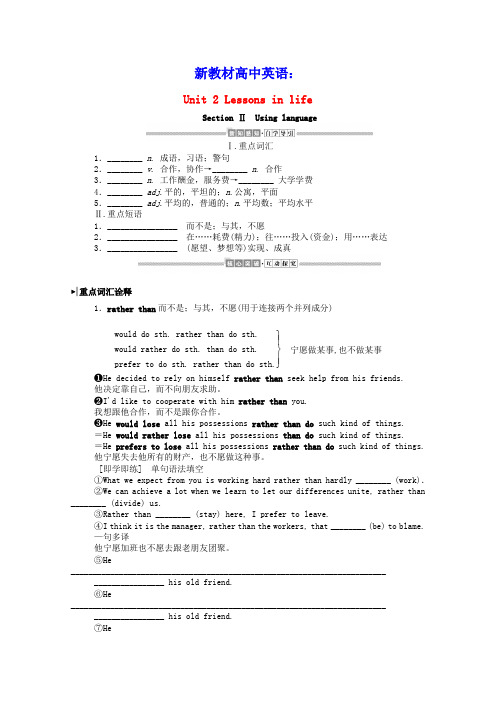
新教材高中英语:Unit 2 Lessons in lifeSection Ⅱ Using languageⅠ.重点词汇1.________ n . 成语,习语;警句2.________ v . 合作,协作→________ n . 合作3.________ n . 工作酬金,服务费→________ 大学学费4.________ adj .平的,平坦的;n .公寓,平面5.________ adj .平均的,普通的;n .平均数;平均水平Ⅱ.重点短语1.________________ 而不是;与其,不愿2.________________ 在……耗费(精力);往……投入(资金);用……表达3.________________ (愿望、梦想等)实现、成真►|重点词汇诠释1.rather than 而不是;与其,不愿(用于连接两个并列成分)⎭⎪⎬⎪⎫would do sth. rather than do sth.would rather do sth. than do sth.prefer to do sth. rather than do sth. 宁愿做某事,也不做某事❶He decided to rely on himself rather than seek help from his friends. 他决定靠自己,而不向朋友求助。
❷I'd like to cooperate with him rather than you.我想跟他合作,而不是跟你合作。
❸He would lose all his possessions rather than do such kind of things. =He would rather lose all his possessions than do such kind of things. =He prefers to lose all his possessions rather than do such kind of things. 他宁愿失去他所有的财产,也不愿做这种事。
高一英语外研版必修4第4单元学案
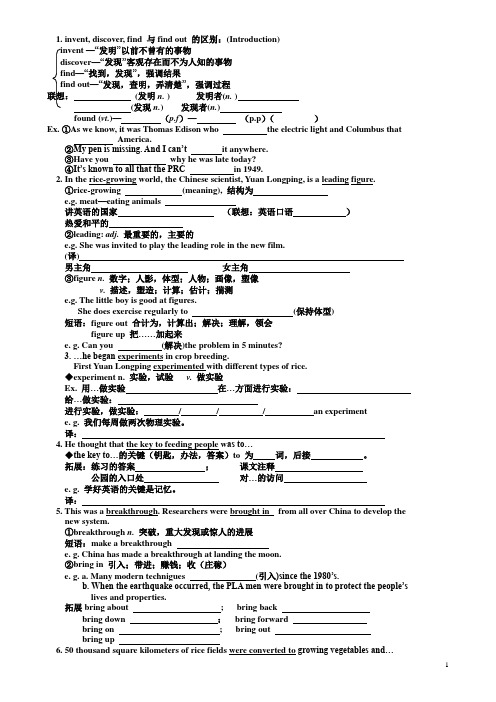
1. invent, discover, find 与find out 的区别:(Introduction)invent —“发明”以前不曾有的事物discover—“发现”客观存在而不为人知的事物find—“找到,发现”,强调结果find out—“发现,查明,弄清楚”,强调过程联想:(发明n. ) 发明者(n. )(发现n.) 发现者(n.)found (vt.)—(p.f)—(p.p)()Ex. ①As we know, it was Thomas Edison who the electric light and Columbus that America.②My pen is missing. And I can’t it anywhere.③Have you why he was late today?④It’s known to all that the PRC in 1949.2. In the rice-growing world, the Chinese scientist, Yuan Longping, is a leading figure.①rice-growing (meaning), 结构为e.g. meat—eating animals讲英语的国家(联想:英语口语)热爱和平的②leading: adj.最重要的,主要的e.g. She was invited to play the leading role in the new film.(译)男主角女主角③figure n.数字;人影,体型;人物;画像,塑像v.描述,塑造;计算;估计;揣测e.g. The little boy is good at figures.She does exercise regularly to (保持体型)短语:figure out 合计为,计算出;解决;理解,领会figure up 把……加起来e. g. Can you (解决)the problem in 5 minutes?3. …he began experiments in crop breeding.First Yuan Longping experimented with different types of rice.◆experiment n. 实验,试验v.做实验Ex. 用…做实验在…方面进行实验:给…做实验:进行实验,做实验:/ / / an experimente. g. 我们每周做两次物理实验。
高中英语外研版必修4学案:Module 1 Section Ⅱ
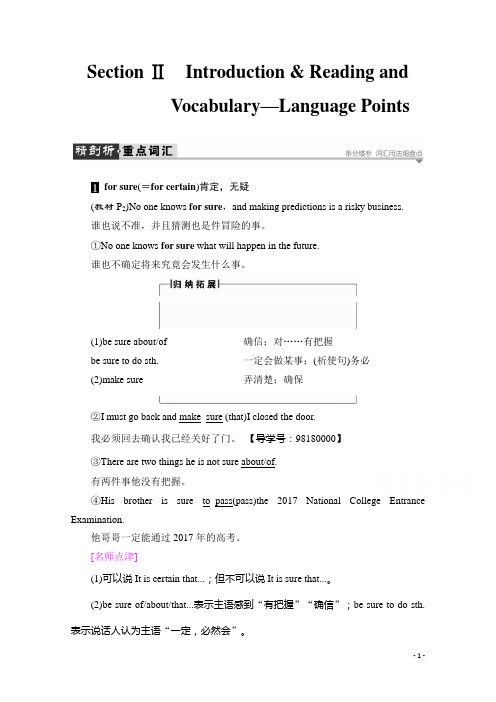
Section ⅡIntroduction & Reading andVocabulary—Language Pointsfor sure(=for certain)肯定,无疑(教材P2)No one knows for sure,and making predictions is a risky business.谁也说不准,并且猜测也是件冒险的事。
①No one knows for sure what will happen in the future.谁也不确定将来究竟会发生什么事。
(1)be sure about/of确信;对……有把握be sure to do sth. 一定会做某事;(祈使句)务必(2)make sure 弄清楚;确保②I must go back and make_sure (that)I closed the door.我必须回去确认我已经关好了门。
【导学号:98180000】③There are two things he is not sure about/of.有两件事他没有把握。
④His brother is sure to_pass(pass)the 2017 National College Entrance Examination.他哥哥一定能通过2017年的高考。
[名师点津](1)可以说It is certain that...;但不可以说It is sure that...。
(2)be sure of/about/that...表示主语感到“有把握”“确信”;be sure to do sth.表示说话人认为主语“一定,必然会”。
run out用完,耗尽(教材P2)In the future,care for the environment will become very important as earth's natural resources run out.在未来,爱护环境将会很重要,因为地球上的自然资源将濒临枯竭。
高中英语外研版必修4学案
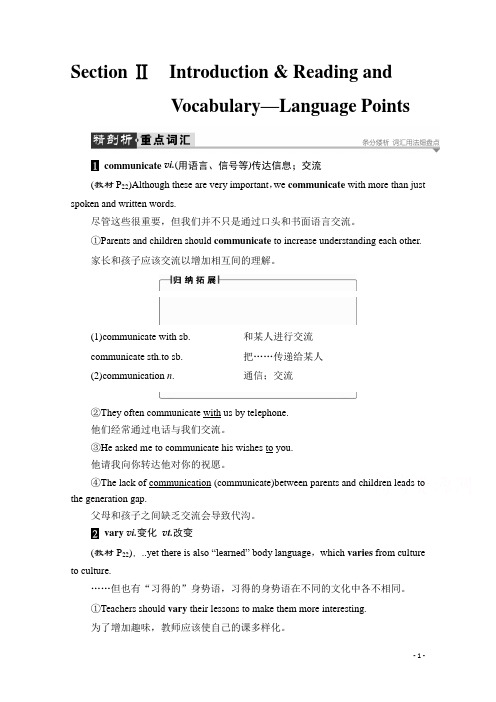
Section ⅡIntroduction & Reading andVocabulary—Language Pointscommunicate v i.(用语言、信号等)传达信息;交流(教材P22)Although these are very important,we communicate with more than just spoken and written words.尽管这些很重要,但我们并不只是通过口头和书面语言交流。
①Parents and children should communicate to increase understanding each other.家长和孩子应该交流以增加相互间的理解。
(1)communicate with sb.和某人进行交流communicate sth.to sb. 把……传递给某人(2)communication n. 通信;交流②They often communicate with us by telephone.他们经常通过电话与我们交流。
③He asked me to communicate his wishes to you.他请我向你转达他对你的祝愿。
④The lack of communication (communicate)between parents and children leads to the generation gap.父母和孩子之间缺乏交流会导致代沟。
vary v i.变化v t.改变(教材P22)...yet there is also “learned” body language,which varies from culture to culture.……但也有“习得的”身势语,习得的身势语在不同的文化中各不相同。
①Teachers should vary their lessons to make them more interesting.为了增加趣味,教师应该使自己的课多样化。
高中英语外研版必修4学案学案2:Module6 整单元 (外研版必修4)
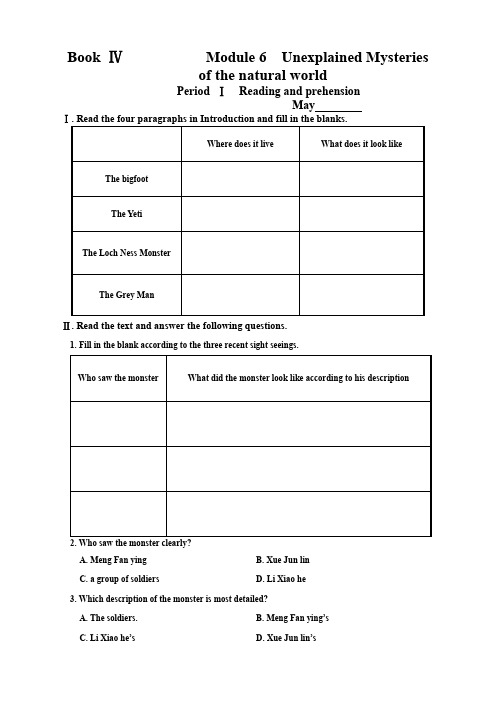
Book ⅣModule 6 Unexplained Mysteriesof the natural worldPeriod ⅠReading and prehensionMayⅡ. Read the text and answer the following questions.1. Fill in the blank according to the three recent sight seeings.2. Who saw the monster clearly?A. Meng Fan yingB. Xue Jun linC. a group of soldiersD. Li Xiao he3. Which description of the monster is most detailed?A. The soldiers.B. Meng Fan ying’sC. Li Xiao he’sD. Xue Jun lin’s4. According to the text, which statement is true?A. There have been reports of monsters in lake Tian chi since the beginning of this century.B. Lake Tian chi is the highest volcanic lake in the world.C. Scientist are sure that there is a monster in lake Tianchi.D. People have taken clear photos of the monster.Ⅲ. Translate the following into Chinese.1. The “Monster of lake Tianchi” is back in the news after several recent sightseeings.2. Many people think the monster may be a distant cousin of the loch Ness Monster in Scotland3. They say that the 1000-temperater lake is unlikely to be able to support such large livingcreatures.4. It covers an area of about tin square kilometers.5. 靠近,走近6、一个吓人的动物7. 在颜色上8. 清楚地看到9. 潜入水中10. 占有……面积附第课时答案:I. 答案见课文。
外研版高中英语必修4模块1学案
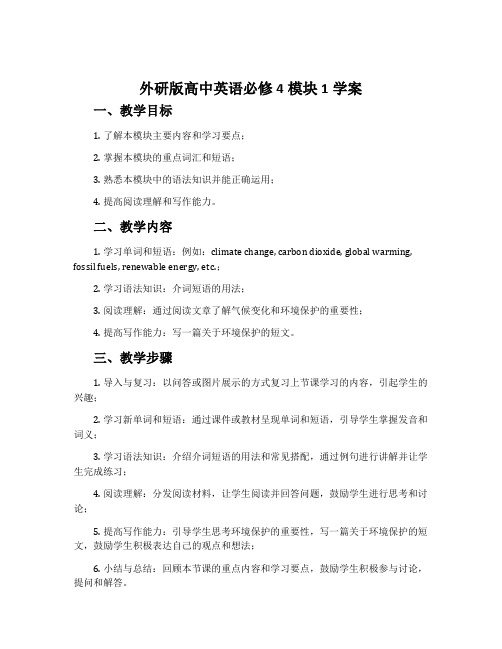
外研版高中英语必修4模块1学案一、教学目标1.了解本模块主要内容和学习要点;2.掌握本模块的重点词汇和短语;3.熟悉本模块中的语法知识并能正确运用;4.提高阅读理解和写作能力。
二、教学内容1.学习单词和短语:例如:climate change, carbon dioxide, global warming, fossil fuels, renewable energy, etc.;2.学习语法知识:介词短语的用法;3.阅读理解:通过阅读文章了解气候变化和环境保护的重要性;4.提高写作能力:写一篇关于环境保护的短文。
三、教学步骤1.导入与复习:以问答或图片展示的方式复习上节课学习的内容,引起学生的兴趣;2.学习新单词和短语:通过课件或教材呈现单词和短语,引导学生掌握发音和词义;3.学习语法知识:介绍介词短语的用法和常见搭配,通过例句进行讲解并让学生完成练习;4.阅读理解:分发阅读材料,让学生阅读并回答问题,鼓励学生进行思考和讨论;5.提高写作能力:引导学生思考环境保护的重要性,写一篇关于环境保护的短文,鼓励学生积极表达自己的观点和想法;6.小结与总结:回顾本节课的重点内容和学习要点,鼓励学生积极参与讨论,提问和解答。
四、教学方法1.演示法:通过课件、图片等辅助材料呈现新词汇和语法知识;2.合作学习:鼓励学生在小组内讨论,互相交流和帮助;3.创造性思维:引导学生进行发散思维,培养学生创造性思考和表达能力。
五、教学评价1.口头评价:教师通过提问和讨论的方式,检查学生对课堂内容的掌握情况;2.笔头评价:分发练习题或作文题,让学生进行书面评价。
六、教学资源1.教材:《外研版高中英语必修4》2.课件:包括单词和短语的呈现、语法知识的讲解、阅读材料的展示等;3.练习题和作文题。
以上是关于外研版高中英语必修4模块1学案的简要介绍,本学案的教学目标是帮助学生了解气候变化和环境保护的重要性,掌握相关的词汇和语法知识,并提高阅读和写作能力。
- 1、下载文档前请自行甄别文档内容的完整性,平台不提供额外的编辑、内容补充、找答案等附加服务。
- 2、"仅部分预览"的文档,不可在线预览部分如存在完整性等问题,可反馈申请退款(可完整预览的文档不适用该条件!)。
- 3、如文档侵犯您的权益,请联系客服反馈,我们会尽快为您处理(人工客服工作时间:9:00-18:30)。
Module 6 Unexplained Mysteries of the Nature World情态动词+have done的用法语境自主领悟先观察原句后自主感悟①Many people think the monster may be a distantcousin of the Loch Ness monster in Scotland.②They also think that there might be similar creatures in other lakes around the world.③But in China,the idea of the dragon may have come from the alligator.④You might have given your parents more help earlier.⑤It must have rained last night,for the road was quite muddy.⑥He can't have forgotten it,for he talked about it yesterday.⑦You ought to/should have done the job more carefully.⑧You oughtn't to/shouldn't have asked such a foolish question. 1.①②句表示可能性的推测,意为“可能,也许”。
2.③④句表示对过去发生的事情的推测,意为“可能已经”。
3.⑤句表示对过去事情的很有把握的肯定推测,意为“肯定做过某事”,而⑥句则表示对过去发生事情的有把握的否定推测,意为“不可能做过某事”。
4.⑦句表示“过去本应该做却未做的事”,⑧句则表示“过去本不该发生却发生了的事”。
1.may/might have done sth.表示对过去行为的推测,意为“也许/或许已经做过某事”,might可能性更小,主要用于肯定句和否定句中。
John isn't at home.I think he may/might have gone to school.约翰不在家,我想他可能去上学了吧。
You might have read about it in the newspapers.你可能已经在报纸上看到这个消息了。
[名师点津]might have done有时表示“本来可以做的事而实际上没有做”,含有“劝告,责备”的语气。
You might have been more careful.你本来可以多加小心的。
2.must have done sth.表示对过去发生的事或行为的肯定推测,意为“一定做过某事”,只用于肯定句中。
He reasoned that since she had not answered his letter she must have left here.他推断,由于她没有给他回信,她一定是已经离开这里了。
[名师点津]含有must have done结构的反意疑问句中,若有表示过去的时间状语,反意疑问部分用“didn't+主语?”;若没有表示过去的时间状语,反意疑问部分则用“haven't/hasn't+主语?”。
They must have gone there last night,didn't they?他们昨晚一定是去那里了,不是吗?They must have been to the Great Wall,haven't they?他们一定去过长城,不是吗?3.can/could have done sth.是对过去的推测,表示“可能做过某事”,主要用于否定句和疑问句中。
could语气较委婉,肯定句中一般用could不用can。
Mr.Smith can't have gone to Beijing,for I saw him in the library just now.史密斯先生不可能去北京了,我刚才还在图书馆见过他。
— Where can they have gone?— They could have gone to the cinema.——他们能去哪里呢?——他们可能去电影院了。
[名师点津]could have done sth.还可表示过去本可以完成而实际上未完成的动作。
You could have done better,but you were too careless.你本来可以做得更好,但你太粗心了。
[即时训练1] 用适当的情态动词填空①George can't have gone too far.His coffee is still warm.②—We are very worried about Tom.Why hasn't he come back?—Don't worry.He may/might have been caught in a traffic jam.③—How did you do in the test?—Not so well.I could have done much better but I misread the directions.④The streets are wet.It must have rained last night.4.ought to/should have done 表示过去本来应该做某事(而实际上并没有做),意为“理应做……,本来应该做……”,常表示遗憾;ought not to/shouldn't have done 表示“过去本来不应该做某事(而实际上做了)”,含有指责对方或自责的意味。
The flowers have died.I should have watered them often.这些花儿都死了。
我本来应该常给它们浇水的。
(其实没浇水,表示遗憾)You ought not to have told them the truth.你本不应该告诉他们真相的。
(其实你告诉他们了,含有责备的意味)5.needn't have done sth.表示“本来不必做某事(实际上已经做了)”; need have done sth.表示“本来需要做某事(实际上未做)”I needn't have bought so much wine — only five people came.我本来没有必要买这么多酒——只来了五个人。
He need have hurried to the station.In that case,he wouldn't have missed the train.他本来需要快点去车站。
那样的话,他就不会耽误了火车。
6.would have done sth.表示“原本想做某事”;也可以用于虚拟语气中,表示与过去事实相反。
I would have given you the book yesterday,but I didn't cover it completely.我原本想昨天给你那本书的,可是我没能全部读完。
It would never have happened without your help.要不是你的帮助,这绝不会发生。
[即时训练2] 用适当的情态动词填空①I needn't have worried before I came to the new school,for my classmates here are very friendly to me.②—Sorry,Mum! I failed the job interview again.—Oh,it's too bad.You should have made full preparations.③They were abroad during the months when we were carrying out the investigation,or they would have come to our help.Ⅰ.单句语法填空1.He could/might have passed the exam,but he was too careless.2.Mary can't have stolen your money.She has gone home.3.Mr.White should have arrived at 8:30 a.m.for the meeting,but he didn't show up.4.You needn't have woken me up; I don't have to go to work today.5.Nobody answered the doorbell; he must have gone out.6.He might have said so at the meeting, but I'm not sure.7.You shouldn't have blamed the boy just now; after all,he is only a child.8.He must have known(know) what she wanted.9.I could have arrived here on time,but my car broke down on the way.10.He needn't have watered(water) the flowers, but he needed to do something to kill time.Ⅱ.单句改错1.He was not in the office.I thought he may gone home.may后加have 2.— Most students in my class failed in the math test.— It mustn't have been easy. mustn't→couldn't3.I was really anxious about you.You couldn't have left home without a word.couldn't→shouldn't 4.The driver must have drunk a lot before the accident,but I am not quite sure of that. must→might 5.You should come to the meeting. What was the reason for your absence?should后加have 6.I shouldn't have enjoyed myself more—it was a perfect day.shouldn't→couldn't 7.You could done it better, but you didn't try your best.could后加have 8.Honestly,you would have told me. would→might9.The cake is very sweet. You must put a lot of sugar in it.must后加have 10.You ought have done this exercise more carefully. ought后加to。
